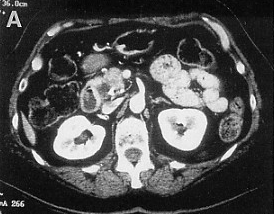MM-398 Improves Survival in Pancreatic Cancer
A phase III trial found that MM-398 in combination with other drugs increases overall survival in pre-treated patients with metastatic pancreatic cancer.
Mass in head of pancreas.

A phase III trial has shown that the combination of a drug known as MM-398 in combination with 5-fluorouracil (5-FU) and leucovorin increases overall survival compared with 5-FU and leucovorin alone in patients with metastatic pancreatic cancer previously treated with gemcitabine-based therapy. MM-398 is in development by Merrimack Pharmaceuticals.
MM-398 is a “nanoliposomal encapsulation of the chemotherapeutic irinotecan.” Other irinotecan formulations are approved for treating colorectal cancers. The phase III NAPOLI-1 trial had an enrollment of 417 patients.
According to a press release from the company, the MM-398 combination yielded an overall survival of 6.1 months, or 1.9 months improvement over the 5-FU and leucovorin arm (P = .012). The hazard ratio for survival was 0.67, and there was also a statistically significant improvement in progression-free survival.
The study also included patients who received MM-398 as monotherapy, without 5-FU and leucovorin. The median overall survival in these patients was 4.9 months, which was not significantly different than the control group, and adverse events were more common with the monotherapy than in combination.
The most common grade 3 or higher adverse events in the MM-398/5-FU/leucovorin group were neutropenia (14.5%), fatigue (13.7%), diarrhea (12.8%), and vomiting (11.1%). Only sepsis, at 3.4% in the study group, had a greater than 2% difference compared with the control arm.
“We are excited by the results of NAPOLI-1 study because of the critical need to help patients with this devastating illness and are moving forward as quickly as possible to get MM-398 to patients,” said the Merrimack CEO Robert Mulroy. The NAPOLI-1 results will be presented at the European Society for Medical Oncology World Conference on Gastrointestinal Cancer in Spain in June, and the company plans to submit a New Drug Application to the US Food and Drug Administration sometime this year.
“This demonstration of a survival benefit from the MM-398 plus 5-FU and leucovorin combination is particularly important given that we have very few treatment options for patients in this tough clinical setting,” said the NAPOLI-1 principal investigator Daniel D. Von Hoff, MD, of the Virginia G. Piper Cancer Center in Scottsdale, Arizona. The Pancreatic Cancer Action Network has a goal of doubling pancreatic cancer survival by 2020.
Study Details
NAPOLI-1 is a randomized, open-label phase III trial. All patients received prior gemcitabine-based therapy. Patients in the MM-398 combination group received 80 mg/m2 of the study drug along with 5-FU and leucovorin every 2 weeks; in the monotherapy group, they received 120 mg/m2 of MM-398 every 3 weeks. The study drug is also under investigation for treatment of metastatic colorectal cancer, Ewing sarcoma, and glioma.